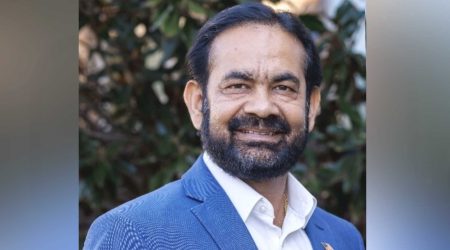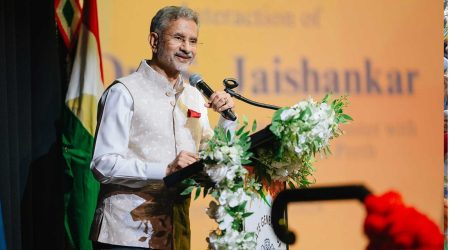Khavda: A remote airstrip nestled amidst vast barren lands bordering Pakistan has transformed into an unexpected gateway to one of the world’s largest renewable energy parks. Initially a modest strip lacking even an air traffic controller, equipped only with a portable toilet and a makeshift office, this location piqued the interest of investors, including a notable figure who once ranked among the world’s wealthiest.
Despite its seemingly inhospitable environment—characterized by sparse vegetation due to saline soil—the area possessed remarkable natural resources, boasting the country’s second-best solar radiation and wind speeds five times that of the plains. Recognizing its potential, plans were set in motion to establish a sprawling renewable energy park spanning 538 square kilometers, roughly five times the size of Paris.
Solar panels and wind turbines now dot the region, poised to harness sunlight and wind with unparalleled efficiency. Infrastructure developments followed suit, including worker colonies, desalination plants to convert saline groundwater into potable water, and essential amenities such as mobile phone repair shops.
Adani Green Energy Ltd, unveiled plans to invest approximately ₹1.5 lakh crore to generate 30 megawatts of clean electricity within Gujarat’s Kutch region. With an initial capacity of 2 gigawatts already commissioned and ambitious expansion targets set for subsequent years, the park’s potential to contribute to India’s renewable energy goals is substantial.
Despite the logistical challenges posed by its remote location, the airstrip serves as a vital link for executives commuting from nearby cities. Pilots rely on visual aids and navigation systems for safe landings and coordinate takeoffs with Bhuj’s air traffic control, ensuring a smooth operation despite the absence of sophisticated infrastructure.
The park’s proximity to the international border with Pakistan necessitates stringent security measures, with the perimeter manned by Border Security Force personnel. Despite the harsh conditions—ranging from dust storms to limited communication and transportation options—the project perseveres, driven by a vision of sustainability and innovation.
Adani Group’s ambitious renewable energy plans align with India’s broader objectives of transitioning to non-fossil fuel sources and achieving net-zero emissions by 2070. The Khavda project, with its vast potential to generate clean energy, exemplifies the group’s commitment to environmental stewardship and technological advancement.










